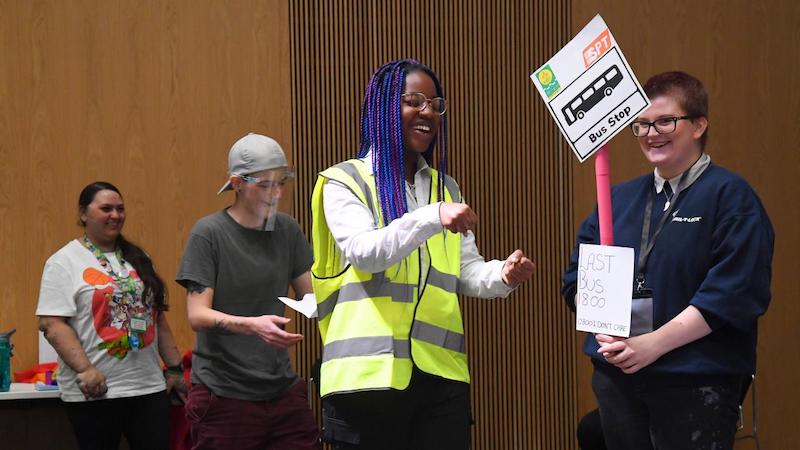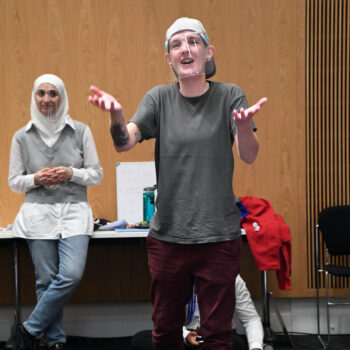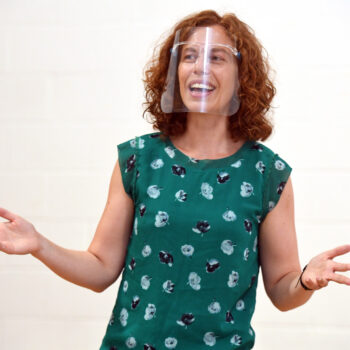In a community center in Glasgow, Scotland, a young person on a makeshift stage faces a group of city council staff. He has just performed a scene in which he cannot enter a park near his home because the surrounding sidewalks don’t have accessible curb cuts; he is a wheelchair user. Another young person, who is blind, has just exited the scene after her character nearly fell on the unkempt, litter-filled ground of the park. A council staff member shoots her hand into the air, offering an idea to change the situation by sending staff into parks to talk to youth — but the idea lands as an accusation towards the young people themselves.
This scene captures some of the challenges and tensions our group of young Glaswegians faced as we worked to re-design Glasgow City Council’s climate-related practices, advocating for transportation and neighborhood planning policies that would reduce emissions and address inequities based on income, race, age, geography, and ability. The group came together via a process called Legislative Theatre (LT), which is a branch of the Theatre of the Oppressed methodology, first practiced in Brazil by Augusto Boal.
In Legislative Theatre, those who are directly impacted by unjust or inequitable systems and institutions create a play based on their experiences. The performances aren’t scripted but devised by the community of actors — in this case, young people — through a short rehearsal process. They invite peers, advocates, and policymakers to watch the play, discuss the problems, and improvise new rules and strategies.
The central element of LT is an interactive forum in which audiences can dialogue and then try out new ideas onstage; the actors are prepared to improvise to show how those policy changes would or wouldn’t work. The theatrical energy encourages the audience to try out ideas that might not be considered viable or serious in another policymaking space, such as starting every Council meeting with a pizza feast or replacing all religious education classes in UK schools with climate crisis education. Finally, the actors and audience work together to pitch, debate, and prioritize three-to-four new policy proposals. At the end of the event, the audience votes on the proposals, and community leaders and policymakers make commitments to act.
LT is a participatory democracy process that grew out of popular education and community organizing traditions. It must be rooted in the desires, aims, and strategies of those most impacted by the problems. Local governments and institutions in the UK have begun to engage in participatory policy-making processes more often over the past few years, but LT and other artistic, community-based strategies remain rare. These strategies might seem risky for policymakers to participate in as they are designed to call out problematic power dynamics and facilitate policy ideas that challenge the status quo. However, from a community organizing perspective, LT can be a valuable tool for engaging young people in political work, as it prioritizes fun and accessibility while aiming for tangible results on a relatively short timeline. All of these elements can activate young people around a campaign and offer a process that community groups can replicate relatively easily on different issues.
Working From Our Strengths
In 2020, Glasgow City Council’s sustainability team invited two youth community and advocacy groups that are generally excluded from decisions around climate policy — Glasgow Disability Alliance (GDA), an advocacy group led by a membership of over 5,000 disabled people, and Young Movers (YoMo), a neighborhood-based group of young people from low-income communities around Glasgow — to develop LT on the city’s climate and sustainability strategy ahead of COP26. One of us, Charlotte, is a youth worker and former member with GDA; the other, Katy, served as the facilitator. A local participatory democracy organization, Shared Future CIC, helped coordinate. Katy led a series of open meetings and workshops with dozens of GDA and YoMo members. A group of eight members committed to identify the issues, create and perform a play, and lead discussions with their peers.
The young people and Katy began by playing games that come from the LT toolbox. Games are silly — anyone can take part. But they allow us to critically reflect on our lived experience.One such game, “Opposite of Jackson,” turns commands that we respond to in our everyday lives upside-down. When the leader calls “Stop!,” everyone moves around the space, and when they call “Move!,” everyone stops. When they call “Clap,” everyone stomps a foot, and when they call “Stomp!,” everyone claps. After the Opposites game, we talked about how we are taught to accept rules and policies as inevitable from a young age — by our parents, teachers, governments, media. But sometimes, we need to do the opposite. Through imaginative play, young people were able to try things that seemed totally ridiculous and then wonder if they could make an out-of-the-box or unexpected change in the real world.
As we reflected on the games, we told stories about climate policy in Glasgow through the lens of power: which neighborhoods are more or less connected and resourced, requiring people to own and use a car to get basic essentials; the barriers to using the bus for disabled people; lack of access to and care for parks in low-income neighborhoods; and how young people are not truly valued or welcomed into local consultation processes on transport and neighborhood planning. We used our bodies to create images of the city we envisioned and the power that young people wanted to hold in the creation of that city, and then turned those images into scenes of a play.
In July 2021, we held our first performative policy-creation session with council staff working on sustainability in transport and neighborhood planning. We were excited to share our work with the council staff but also worried that the session might end up feeling like a traditional, top-down, “tick-box” exercise in public engagement — an opportunity for adults to say they’d listened to the concerns of young people without actually sharing decision-making power. The young people already had experiences engaging with the council at school assemblies and other public events. Many felt that officials had been talking at them, delivering information and sometimes making judgements instead of truly engaging. The group hoped that by agreeing to participate in a youth-led process, the council was signaling that it was open to listening and engaging in a more meaningful way.
But when we invited the audience to improvise new ideas to address the problems young people laid out in their scenes, some audience members started contradicting them. That first performance became a power struggle, and the primary tool the officials used in that struggle was language. Some of the policymakers were so used to their own jargon that they were unable to engage with the youth on other terms. They spoke over the young people in the policy-ideation section of the event, interrupting to correct their phrasing. One of the Council staff members stood on the stage with the actor and said, “Why don’t you show up to consultations on our timeline? You aren’t making enough effort. And they’re not called green spaces; they’re called open spaces, so we can’t have the conversation until you get the words right.”
The Council had invited us to work together on this project, but we would have to flip the power dynamics to make it work for us. We regrouped after the event. One member suggested that we show a staff person ignoring everyone and condescending to the youth showing up to a public event to give input. Someone else asked, will we get in trouble if we reflect those powerful people’s behavior back to them in public? We talked about whether it was worth the group’s energy to continue critiquing local government and risk feeling disrespected or discredited again. We agreed it was a risk we had to take because if we didn’t challenge the power there, we would not be able to shift the conversation to ensure a just transition to a green Glasgow.
Creating a New Language Onstage
We improvised new scenes to show exactly what happened in our first performance. Then we took a leap and called up a receptive Council staff member to ask if he’d perform in the play with us to reflect the problems from the inside. He joined our rehearsals and, from the first moment, was willing to go farther than we’d imagined in satirizing the behaviors of people in power. He played a council person stuck to his phone, ignoring young people even as he asked for their participation. In another new scene, set at a community-engagement event in the park, he stood behind a sign and rebuffed everyone who tried to engage. One character asked where all the bees had gone, and he bombarded them with scientific language until they walked away. We had fun with the scenes, which allowed us to take a risk. We hoped our audience would laugh along with us.
At our second LT session in September, the actors recruited other young people and disabled youth and adults – friends, neighbors, and members of YoMo and GDA – to be part of the audience alongside the council staff and “experts.” The audience did indeed laugh with us, and in the policy improvisation and debate, the young people’s peers came up with funny and radical new policy ideas. In one improv, a disabled person in the audience came onstage, announced they were holding a “consultation,” and invited the council but then said there wasn’t space for any of them and they’d have to stand outside: essentially flipping the circumstances that disabled Glaswegians find themselves in when they’re invited to policymaking events that aren’t actually accessible or intended for participation.
The group was taking back the language of power and transforming it through the medium of theater. We were using an artistic process, but one with very few rules. We didn’t have to go to a council testimonial to stand in a certain spot, dress up nicely, and speak for three minutes. Through theater, we centered young people’s everyday experiences and needs, lifting that weight of getting the language right. The problems young people are facing exist no matter what terminology we use. It’s simply about moving down the street, about getting on the bus, about being able to breathe clean air in public spaces.
The second event led to more concrete policy proposals, with voting and commitments for action. Some of these were easy wins, like creating an easy-read version of Council strategies online or developing an interactive online map of land-use applications. Others were more far-reaching, like undoing the privatization of bus service in the city and bringing all service back under Council control in order to have public power over bus routes, fares, and accessibility design, which is currently under review by the Council.
The third performance, a celebration with friends, family, and supporters, reaffirmed that this was our process. Many members of our group participated in youth-led events at and around COP26 in the following weeks and spoke publicly about taking power in climate action. But more important for us was the experience of building collective power and relationships through these performances — which will help facilitate ongoing critical engagement.
What’s Next
In Glasgow, the power struggle between youth leaders and policymakers took the form of language — specifically, how formal and political language were used to deflect young people’s real, hard-hitting critiques. Those power dynamics will continue. One of the group’s takeaways was that they could design the format and venue themselves, to reshape unjust policies and practices. They’d come out on the other side of the journey with a few policy wins, but also narrative shifting-wins. They had illuminated the ways decision-making spaces often use language as a tool of exclusion, and they created a joyful, playful, and inclusive space to invite decision-makers to engage on new terms. The energy from those wins led the group to look to do more together. At our final celebration, some of the young people began to plan for their own Legislative Theatre processes around inequities in higher education in Scotland.
One play – or one campaign — won’t be the last time we need to challenge policies or rule-makers. Making change requires rehearsal: improvising a strategy, testing it against our target audience, assessing the response, and then using that information to tell the story and improvise new tactics all over again. Rehearsal and play can reveal solutions that we hadn’t imagined before, and repetition can build our strength to fight necessary battles. As Augusto Boal said, we are all actors, capable of taking creative action in our own lives and communities.


